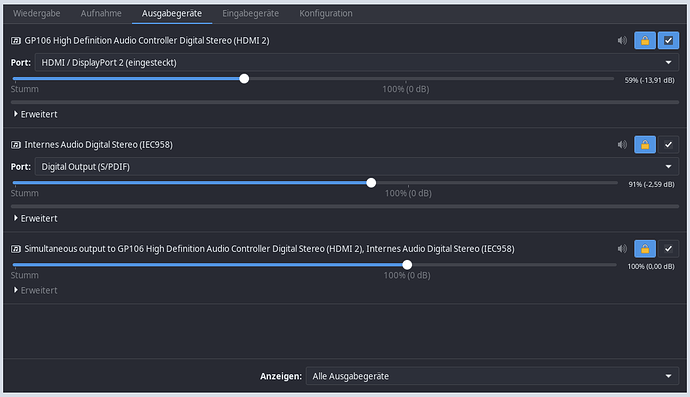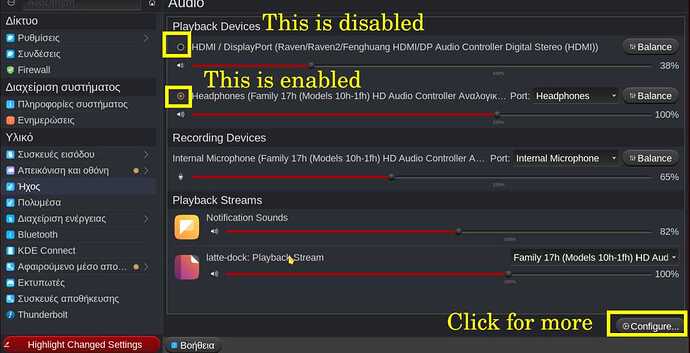Hello, I am a Student from Chennai and I recently installed Garuda in my laptop for educational use. But after installation, I was never able to hear any sounds (but the sound icon is shown and in the task bar, the sound widget shows the message "No output or input devices found" under Devices tab. Please help me out Garuda team. I have gone through all your forums including other Arch forums, but nothing was useful for my issue. I am a Debian user and recently switched to Garuda, and hence I also find it hard to fix such issues all by myself. Garuda works fine and smooth except for this 1 issue. So kindly please help me out ASAP. Thanks in advance.
Right click on icon and change settings (port) in volume control, IIRC it is written in forum.
Read
please
and post
inxi -Fxxxza
as text!
and
╭─cyberkid@Cyberkid in ~
╰─λ inxi -Fxxxza
System: Kernel: 5.11.4-zen1-1-zen x86_64 bits: 64 compiler: gcc v: 10.2.1
parameters: BOOT_IMAGE=/@/boot/vmlinuz-linux-zen root=UUID=ae84c051-cc5d-4562-9701-e0aaa1c58b15
rw rootflags=subvol=@ quiet splash rd.udev.log_priority=3 vt.global_cursor_default=0
systemd.unified_cgroup_hierarchy=1 resume=UUID=73214efc-17e1-4145-895a-3b9f3a0c76ab loglevel=3
Desktop: KDE Plasma 5.21.2 tk: Qt 5.15.2 info: latte-dock wm: kwin_x11 dm: SDDM
Distro: Garuda Linux
Machine: Type: Laptop System: Acer product: Swift SF315-52G v: V1.07 serial: <filter>
Mobo: KBL model: Erdinger_KL v: V1.07 serial: <filter> UEFI: American Megatrends v: 1.07
date: 09/28/2018
Battery: ID-1: BAT0 charge: 29.3 Wh condition: 34.7/48.9 Wh (71%) volts: 15.4/15.2 model: AC17B8K
type: Li-ion serial: N/A status: Discharging
CPU: Info: Quad Core model: Intel Core i5-8250U bits: 64 type: MT MCP arch: Kaby Lake note: check
family: 6 model-id: 8E (142) stepping: A (10) microcode: E0 L2 cache: 6 MiB
flags: avx avx2 lm nx pae sse sse2 sse3 sse4_1 sse4_2 ssse3 vmx bogomips: 28800
Speed: 2250 MHz min/max: 400/3400 MHz Core speeds (MHz): 1: 2250 2: 3046 3: 2311 4: 2170
5: 2716 6: 2825 7: 2753 8: 2386
Vulnerabilities: Type: itlb_multihit status: KVM: VMX disabled
Type: l1tf mitigation: PTE Inversion; VMX: conditional cache flushes, SMT vulnerable
Type: mds mitigation: Clear CPU buffers; SMT vulnerable
Type: meltdown mitigation: PTI
Type: spec_store_bypass mitigation: Speculative Store Bypass disabled via prctl and seccomp
Type: spectre_v1 mitigation: usercopy/swapgs barriers and __user pointer sanitization
Type: spectre_v2
mitigation: Full generic retpoline, IBPB: conditional, IBRS_FW, STIBP: conditional, RSB filling
Type: srbds mitigation: Microcode
Type: tsx_async_abort status: Not affected
Graphics: Device-1: Intel UHD Graphics 620 vendor: Acer Incorporated ALI driver: i915 v: kernel
bus ID: 00:02.0 chip ID: 8086:5917 class ID: 0300
Device-2: NVIDIA GP108M [GeForce MX150] vendor: Acer Incorporated ALI driver: nouveau v: kernel
bus ID: 01:00.0 chip ID: 10de:1d10 class ID: 0302
Device-3: Sunplus Innovation HD User Facing type: USB driver: uvcvideo bus ID: 1-7:3
chip ID: 1bcf:2cb0 class ID: 0e02
Display: x11 server: X.Org 1.20.10 compositor: kwin_x11 driver: loaded: intel,nouveau
unloaded: modesetting alternate: fbdev,nv,vesa display ID: :0 screens: 1
Screen-1: 0 s-res: 1920x1080 s-dpi: 96 s-size: 508x285mm (20.0x11.2") s-diag: 582mm (22.9")
Monitor-1: eDP1 res: 1920x1080 hz: 60 dpi: 143 size: 340x190mm (13.4x7.5") diag: 389mm (15.3")
OpenGL: renderer: Mesa Intel UHD Graphics 620 (KBL GT2) v: 4.6 Mesa 20.3.4 direct render: Yes
Audio: Device-1: Intel Sunrise Point-LP HD Audio vendor: Acer Incorporated ALI driver: snd_soc_skl
v: kernel alternate: snd_hda_intel bus ID: 00:1f.3 chip ID: 8086:9d71 class ID: 0401
Sound Server: ALSA v: k5.11.4-zen1-1-zen
Network: Device-1: Intel Wireless 7265 driver: iwlwifi v: kernel port: e000 bus ID: 02:00.0
chip ID: 8086:095a class ID: 0280
IF: wlp2s0 state: up mac: <filter>
Bluetooth: Device-1: Intel Bluetooth wireless interface type: USB driver: btusb v: 0.8 bus ID: 1-6:2
chip ID: 8087:0a2a class ID: e001
Message: Required tool hciconfig not installed. Check --recommends
RAID: Hardware-1: Intel 82801 Mobile SATA Controller [RAID mode] driver: ahci v: 3.0 port: f060
bus ID: 00:17.0 chip ID: 8086.282a rev: 21
Drives: Local Storage: total: 1.03 TiB used: 18.42 GiB (1.8%)
SMART Message: Unable to run smartctl. Root privileges required.
ID-1: /dev/sda maj-min: 8:0 vendor: Western Digital model: WD10SPZX-21Z10T0 size: 931.51 GiB
block size: physical: 4096 B logical: 512 B speed: 6.0 Gb/s rotation: 5400 rpm serial: <filter>
rev: 1A02 scheme: GPT
ID-2: /dev/sdb maj-min: 8:16 vendor: SK Hynix model: HFS128G39TND-N210A size: 119.24 GiB
block size: physical: 4096 B logical: 512 B speed: 6.0 Gb/s rotation: SSD serial: <filter>
rev: 1P10 scheme: GPT
Partition: ID-1: / raw size: 96.53 GiB size: 96.53 GiB (100.00%) used: 18.42 GiB (19.1%) fs: btrfs
dev: /dev/sda6 maj-min: 8:6
ID-2: /boot/efi raw size: 256 MiB size: 252 MiB (98.46%) used: 549 KiB (0.2%) fs: vfat
dev: /dev/sda5 maj-min: 8:5
ID-3: /home raw size: 96.53 GiB size: 96.53 GiB (100.00%) used: 18.42 GiB (19.1%) fs: btrfs
dev: /dev/sda6 maj-min: 8:6
ID-4: /var/log raw size: 96.53 GiB size: 96.53 GiB (100.00%) used: 18.42 GiB (19.1%) fs: btrfs
dev: /dev/sda6 maj-min: 8:6
ID-5: /var/tmp raw size: 96.53 GiB size: 96.53 GiB (100.00%) used: 18.42 GiB (19.1%) fs: btrfs
dev: /dev/sda6 maj-min: 8:6
Swap: Kernel: swappiness: 10 (default 60) cache pressure: 75 (default 100)
ID-1: swap-1 type: partition size: 16 GiB used: 0 KiB (0.0%) priority: -2 dev: /dev/sda4
maj-min: 8:4
ID-2: swap-2 type: zram size: 979.2 MiB used: 0 KiB (0.0%) priority: 32767 dev: /dev/zram0
ID-3: swap-3 type: zram size: 979.2 MiB used: 0 KiB (0.0%) priority: 32767 dev: /dev/zram1
ID-4: swap-4 type: zram size: 979.2 MiB used: 0 KiB (0.0%) priority: 32767 dev: /dev/zram2
ID-5: swap-5 type: zram size: 979.2 MiB used: 0 KiB (0.0%) priority: 32767 dev: /dev/zram3
ID-6: swap-6 type: zram size: 979.2 MiB used: 0 KiB (0.0%) priority: 32767 dev: /dev/zram4
ID-7: swap-7 type: zram size: 979.2 MiB used: 0 KiB (0.0%) priority: 32767 dev: /dev/zram5
ID-8: swap-8 type: zram size: 979.2 MiB used: 0 KiB (0.0%) priority: 32767 dev: /dev/zram6
ID-9: swap-9 type: zram size: 979.2 MiB used: 0 KiB (0.0%) priority: 32767 dev: /dev/zram7
Sensors: System Temperatures: cpu: 63.0 C mobo: 27.8 C gpu: nouveau temp: 51.0 C
Fan Speeds (RPM): N/A
Info: Processes: 258 Uptime: 1h 33m wakeups: 6434 Memory: 7.65 GiB used: 3.22 GiB (42.0%)
Init: systemd v: 247 Compilers: gcc: 10.2.0 clang: 11.1.0 Packages: pacman: 1548 lib: 349
Shell: fish v: 3.1.2 running in: konsole inxi: 3.3.01
╭─cyberkid@Cyberkid in ~ took 5s
Thank you for responding soon Garuda Team but sadly I couldn't follow your words. I am a CS student with Kali Linux background and not a professional Arch Linux user so kindly please put it in layman's words. I am a Debian user and I have no idea how to even work in terminal in Arch. Still a long way to go. Please help me out. And moreover, this problem didn't arise because of something which I did, but it was already there right after Garuda got installed itself. I checked with USB boot and the same issue is present then too. There's no audio at all but I see the audio symbol fade in when I play any audio but I don't hear it. Is there anything I need to do with Pulseaudio, or my Soundcard or alsamixer?
Brother can you please share the steps for getting this window? for me there's no port / settings option if I right click on volume icon in my task bar in top. Also let me know if this is a default window or do I need to install any tool to get this window you just shared now. And am really sorry if I am being Level Zero in this forum. I can't help myself as I am trying to fix this audio issue all by myself since past 2 days and I couldn't so I did a snapshot recovery to the start everytime I failed.
You must click on volume control first.
or
pavucontrol
in terminal
No there's no port / settings / volume control option when I right click.
Available options are :
Force mute all
Configure Audio Device
Configure Audio Volume
Layouts
Widgets
Add Dock/panel
Configure Latte
and output for pavucontrol is
╭─cyberkid@Cyberkid in ~
╰─λ pavucontrol
pavucontrol may be found in the following packages:
extra/pavucontrol 1:4.0-2 /usr/bin/pavucontrol
Do you use pipewire?
Use configure audio device.
Or install pavucontrol.
I am on i3 now and cant change to
KDE Plasma 5.21.2
tried installing pavucontrol in package manager(Add/Remove software) and this error came :
conflicting files:
- linux-tkg-cfs: /usr/lib/modules/5.11.5-135-tkg-cfs/kernel/arch/x86/crypto/aegis128-aesni.ko.xz already exists in filesystem (owned by linux-tkg-muqss)
- linux-tkg-cfs: /usr/lib/modules/5.11.5-135-tkg-cfs/kernel/arch/x86/crypto/aesni-intel.ko.xz already exists in filesystem (owned by linux-tkg-muqss)
- linux-tkg-cfs: /usr/lib/modules/5.11.5-135-tkg-cfs/kernel/arch/x86/crypto/blake2s-x86_64.ko.xz already exists in filesystem (owned by linux-tkg-muqss)
- linux-tkg-cfs: /usr/lib/modules/5.11.5-135-tkg-cfs/kernel/arch/x86/crypto/blowfish-x86_64.ko.xz already exists in filesystem (owned by linux-tkg-muqss)
- linux-tkg-cfs: /usr/lib/modules/5.11.5-135-tkg-cfs/kernel/arch/x86/crypto/camellia-aesni-avx-x86_64.ko.xz already exists in filesystem (owned by linux-tkg-muqss)
- linux-tkg-cfs: /usr/lib/modules/5.11.5-135-tkg-cfs/kernel/arch/x86/crypto/camellia-aesni-avx2.ko.xz already exists in filesystem (owned by linux-tkg-muqss)
- linux-tkg-cfs: /usr/lib/modules/5.11.5-135-tkg-cfs/kernel/arch/x86/crypto/camellia-x86_64.ko.xz already exists in filesystem (owned by linux-tkg-muqss)
- linux-tkg-cfs: /usr/lib/modules/5.11.5-135-tkg-cfs/kernel/arch/x86/crypto/cast5-avx-x86_64.ko.xz already exists in filesystem (owned by linux-tkg-muqss)
- linux-tkg-cfs: /usr/lib/modules/5.11.5-135-tkg-cfs/kernel/arch/x86/crypto/cast6-avx-x86_64.ko.xz already exists in filesystem (owned by linux-tkg-muqss)
- linux-tkg-cfs: /usr/lib/modules/5.11.5-135-tkg-cfs/kernel/arch/x86/crypto/chacha-x86_64.ko.xz already exists in filesystem (owned by linux-tkg-muqss)
- linux-tkg-cfs: /usr/lib/modules/5.11.5-135-tkg-cfs/kernel/arch/x86/crypto/crc32-pclmul.ko.xz already exists in filesystem (owned by linux-tkg-muqss)
- linux-tkg-cfs: /usr/lib/modules/5.11.5-135-tkg-cfs/kernel/arch/x86/crypto/crc32c-intel.ko.xz already exists in filesystem (owned by linux-tkg-muqss)
- linux-tkg-cfs: /usr/lib/modules/5.11.5-135-tkg-cfs/kernel/arch/x86/crypto/crct10dif-pclmul.ko.xz already exists in filesystem (owned by linux-tkg-muqss)
- linux-tkg-cfs: /usr/lib/modules/5.11.5-135-tkg-cfs/kernel/arch/x86/crypto/curve25519-x86_64.ko.xz already exists in filesystem (owned by linux-tkg-muqss)
- linux-tkg-cfs: /usr/lib/modules/5.11.5-135-tkg-cfs/kernel/arch/x86/crypto/des3_ede-x86_64.ko.xz already exists in filesystem (owned by linux-tkg-muqss)
- linux-tkg-cfs: /usr/lib/modules/5.11.5-135-tkg-cfs/kernel/arch/x86/crypto/ghash-clmulni-intel.ko.xz already exists in filesystem (owned by linux-tkg-muqss)
- linux-tkg-cfs: /usr/lib/modules/5.11.5-135-tkg-cfs/kernel/arch/x86/crypto/glue_helper.ko.xz already exists in filesystem (owned by linux-tkg-muqss)
- linux-tkg-cfs: /usr/lib/modules/5.11.5-135-tkg-cfs/kernel/arch/x86/crypto/nhpoly1305-avx2.ko.xz already exists in filesystem (owned by linux-tkg-muqss)
- linux-tkg-cfs: /usr/lib/modules/5.11.5-135-tkg-cfs/kernel/arch/x86/crypto/nhpoly1305-sse2.ko.xz already exists in filesystem (owned by linux-tkg-muqss)
- linux-tkg-cfs: /usr/lib/modules/5.11.5-135-tkg-cfs/kernel/arch/x86/crypto/poly1305-x86_64.ko.xz already exists in filesystem (owned by linux-tkg-muqss)
- linux-tkg-cfs: /usr/lib/modules/5.11.5-135-tkg-cfs/kernel/arch/x86/crypto/serpent-avx-x86_64.ko.xz already exists in filesystem (owned by linux-tkg-muqss)
- linux-tkg-cfs: /usr/lib/modules/5.11.5-135-tkg-cfs/kernel/arch/x86/crypto/serpent-avx2.ko.xz already exists in filesystem (owned by linux-tkg-muqss)
- linux-tkg-cfs: /usr/lib/modules/5.11.5-135-tkg-cfs/kernel/arch/x86/crypto/serpent-sse2-x86_64.ko.xz already exists in filesystem (owned by linux-tkg-muqss)
- linux-tkg-cfs: /usr/lib/modules/5.11.5-135-tkg-cfs/kernel/arch/x86/crypto/sha1-ssse3.ko.xz already exists in filesystem (owned by linux-tkg-muqss)
- linux-tkg-cfs: /usr/lib/modules/5.11.5-135-tkg-cfs/kernel/arch/x86/crypto/sha256-ssse3.ko.xz already exists in filesystem (owned by linux-tkg-muqss)
- linux-tkg-cfs: /usr/lib/modules/5.11.5-135-tkg-cfs/kernel/arch/x86/crypto/sha512-ssse3.ko.xz already exists in filesystem (owned by linux-tkg-muqss)
- linux-tkg-cfs: /usr/lib/modules/5.11.5-135-tkg-cfs/kernel/arch/x86/crypto/twofish-avx-x86_64.ko.xz already exists in filesystem (owned by linux-tkg-muqss)
- linux-tkg-cfs: /usr/lib/modules/5.11.5-135-tkg-cfs/kernel/arch/x86/crypto/twofish-x86_64-3way.ko.xz already exists in filesystem (owned by linux-tkg-muqss)
- linux-tkg-cfs: /usr/lib/modules/5.11.5-135-tkg-cfs/kernel/arch/x86/crypto/twofish-x86_64.ko.xz already exists in filesystem (owned by linux-tkg-muqss)
- linux-tkg-cfs: /usr/lib/modules/5.11.5-135-tkg-cfs/kernel/arch/x86/events/amd/power.ko.xz already exists in filesystem (owned by linux-tkg-muqss)
- linux-tkg-cfs: /usr/lib/modules/5.11.5-135-tkg-cfs/kernel/arch/x86/events/intel/intel-cstate.ko.xz already exists in filesystem (owned by linux-tkg-muqss)
- linux-tkg-cfs: /usr/lib/modules/5.11.5-135-tkg-cfs/kernel/arch/x86/events/intel/intel-uncore.ko.xz already exists in filesystem (owned by linux-tkg-muqss)
- linux-tkg-cfs: /usr/lib/modules/5.11.5-135-tkg-cfs/kernel/arch/x86/events/rapl.ko.xz already exists in filesystem (owned by linux-tkg-muqss)
- linux-tkg-cfs: /usr/lib/modules/5.11.5-135-tkg-cfs/kernel/arch/x86/kernel/cpu/mce/mce-inject.ko.xz already exists in filesystem (owned by linux-tkg-muqss)
- linux-tkg-cfs: /usr/lib/modules/5.11.5-135-tkg-cfs/kernel/arch/x86/kvm/kvm-amd.ko.xz already exists in filesystem (owned by linux-tkg-muqss)
- linux-tkg-cfs: /usr/lib/modules/5.11.5-135-tkg-cfs/kernel/arch/x86/kvm/kvm-intel.ko.xz already exists in filesystem (owned by linux-tkg-muqss)
- linux-tkg-cfs: /usr/lib/modules/5.11.5-135-tkg-cfs/kernel/arch/x86/kvm/kvm.ko.xz already exists in filesystem (owned by linux-tkg-muqss)
- linux-tkg-cfs: /usr/lib/modules/5.11.5-135-tkg-cfs/kernel/arch/x86/oprofile/oprofile.ko.xz already exists in filesystem (owned by linux-tkg-muqss)
- linux-tkg-cfs: /usr/lib/modules/5.11.5-135-tkg-cfs/kernel/crypto/842.ko.xz already exists in filesystem (owned by linux-tkg-muqss)
- linux-tkg-cfs: /usr/lib/modules/5.11.5-135-tkg-cfs/kernel/crypto/adiantum.ko.xz already exists in filesystem (owned by linux-tkg-muqss)
- linux-tkg-cfs: /usr/lib/modules/5.11.5-135-tkg-cfs/kernel/crypto/aegis128.ko.xz already exists in filesystem (owned by linux-tkg-muqss)
- linux-tkg-cfs: /usr/lib/modules/5.11.5-135-tkg-cfs/kernel/crypto/aes_ti.ko.xz already exists in filesystem (owned by linux-tkg-muqss)
- linux-tkg-cfs: /usr/lib/modules/5.11.5-135-tkg-cfs/kernel/crypto/af_alg.ko.xz already exists in filesystem (owned by linux-tkg-muqss)
- linux-tkg-cfs: /usr/lib/modules/5.11.5-135-tkg-cfs/kernel/crypto/algif_aead.ko.xz already exists in filesystem (owned by linux-tkg-muqss)
- linux-tkg-cfs: /usr/lib/modules/5.11.5-135-tkg-cfs/kernel/crypto/algif_hash.ko.xz already exists in filesystem (owned by linux-tkg-muqss)
- linux-tkg-cfs: /usr/lib/modules/5.11.5-135-tkg-cfs/kernel/crypto/algif_rng.ko.xz already exists in filesystem (owned by linux-tkg-muqss)
- linux-tkg-cfs: /usr/lib/modules/5.11.5-135-tkg-cfs/kernel/crypto/algif_skcipher.ko.xz already exists in filesystem (owned by linux-tkg-muqss)
- linux-tkg-cfs: /usr/lib/modules/5.11.5-135-tkg-cfs/kernel/crypto/ansi_cprng.ko.xz already exists in filesystem (owned by linux-tkg-muqss)
- linux-tkg-cfs: /usr/lib/modules/5.11.5-135-tkg-cfs/kernel/crypto/asymmetric_keys/asym_tpm.ko.xz already exists in filesystem (owned by linux-tkg-muqss)
- linux-tkg-cfs: /usr/lib/modules/5.11.5-135-tkg-cfs/kernel/crypto/asymmetric_keys/pkcs8_key_parser.ko.xz already exists in filesystem (owned by linux-tkg-muqss)
- linux-tkg-cfs: /usr/lib/modules/5.11.5-135-tkg-cfs/kernel/crypto/asymmetric_keys/tpm_key_parser.ko.xz already exists in filesystem (owned by linux-tkg-muqss)
- linux-tkg-cfs: /usr/lib/modules/5.11.5-135-tkg-cfs/kernel/crypto/async_tx/async_memcpy.ko.xz already exists in filesystem (owned by linux-tkg-muqss)
- linux-tkg-cfs: /usr/lib/modules/5.11.5-135-tkg-cfs/kernel/crypto/async_tx/async_pq.ko.xz already exists in filesystem (owned by linux-tkg-muqss)
- linux-tkg-cfs: /usr/lib/modules/5.11.5-135-tkg-cfs/kernel/crypto/async_tx/async_raid6_recov.ko.xz already exists in filesystem (owned by linux-tkg-muqss)
- linux-tkg-cfs: /usr/lib/modules/5.11.5-135-tkg-cfs/kernel/crypto/async_tx/async_tx.ko.xz already exists in filesystem (owned by linux-tkg-muqss)
- linux-tkg-cfs: /usr/lib/modules/5.11.5-135-tkg-cfs/kernel/crypto/async_tx/async_xor.ko.xz already exists in filesystem (owned by linux-tkg-muqss)
- linux-tkg-cfs: /usr/lib/modules/5.11.5-135-tkg-cfs/kernel/crypto/async_tx/raid6test.ko.xz already exists in filesystem (owned by linux-tkg-muqss)
- linux-tkg-cfs: /usr/lib/modules/5.11.5-135-tkg-cfs/kernel/crypto/authenc.ko.xz already exists in filesystem (owned by linux-tkg-muqss)
- linux-tkg-cfs: /usr/lib/modules/5.11.5-135-tkg-cfs/kernel/crypto/authencesn.ko.xz already exists in filesystem (owned by linux-tkg-muqss
or …
Did you try
Do you use pipewire?
Use configure audio device.
and configure device option is of no good use as it doesn't show any audio devices in my case.
Brother, first of all this problem has been there ever since I installed my Garuda OS. And I didn't install any audio software or toolkit yet.
I hink I am out for help ![]()
pacman -Qi pipewire
Name : pipewire
Version : 1:0.3.23-1
Beschreibung : Low-latency audio/video router and processor
Architektur : x86_64
URL : https://pipewire.org
Lizenzen : LGPL
Gruppen : Nichts
Stellt bereit : libpipewire-0.3.so=0-64
Hängt ab von : rtkit alsa-card-profiles libdbus-1.so=3-64 libncursesw.so=6-64 libsndfile.so=1-64 libudev.so=1-64 libasound.so=2-64 libsystemd.so=0-64 libbluetooth.so=3-64 libsbc.so=1-64 libldacBT_enc.so=2-64
libopenaptx.so=0-64 libfdk-aac.so=2-64
Optionale Abhängigkeiten : pipewire-docs: Documentation
pipewire-media-session: Default session manager
pipewire-alsa: ALSA configuration
pipewire-jack: JACK support
pipewire-pulse: PulseAudio replacement
gst-plugin-pipewire: GStreamer support
Benötigt von : xdg-desktop-portal
Optional für : Nichts
In Konflikt mit : Nichts
Ersetzt : Nichts
Installationsgröße : 5,49 MiB
Packer : Jan Alexander Steffens (heftig) <heftig@archlinux.org>
Erstellt am : Do 04 Mär 2021 19:47:35 CET
Installiert am : Do 04 Mär 2021 22:31:01 CET
Installationsgrund : Installiert als Abhängigkeit für ein anderes Paket
Installations-Skript : Ja
Verifiziert durch : Signatur
sgs@i3 in ~ took 21ms
➜ pacman -Qi pulseaudio
Name : pulseaudio
Version : 14.2-2
Beschreibung : A featureful, general-purpose sound server
Architektur : x86_64
URL : https://www.freedesktop.org/wiki/Software/PulseAudio/
Lizenzen : GPL
Gruppen : Nichts
Stellt bereit : Nichts
Hängt ab von : libpulse=14.2-2 rtkit libltdl speexdsp tdb orc libsoxr webrtc-audio-processing libxtst
Optionale Abhängigkeiten : pulseaudio-alsa: ALSA configuration (recommended) [Installiert]
pulseaudio-zeroconf: Zeroconf support [Installiert]
pulseaudio-lirc: IR (lirc) support [Installiert]
pulseaudio-jack: Jack support [Installiert]
pulseaudio-bluetooth: Bluetooth support [Installiert]
pulseaudio-equalizer: Graphical equalizer [Installiert]
pulseaudio-rtp: RTP and RAOP support [Installiert]
Benötigt von : paprefs pulseaudio-alsa pulseaudio-bluetooth pulseaudio-ctl pulseaudio-equalizer pulseaudio-equalizer-ladspa pulseaudio-jack pulseaudio-lirc pulseaudio-rtp pulseaudio-support pulseaudio-zeroconf
Optional für : bluetooth-autoconnect firefox pasystray pavucontrol speech-dispatcher
In Konflikt mit : Nichts
Ersetzt : pulseaudio-xen<=9.0 pulseaudio-gconf<=11.1
Installationsgröße : 6,21 MiB
Packer : Jan Alexander Steffens (heftig) <heftig@archlinux.org>
Erstellt am : Do 21 Jan 2021 00:19:31 CET
Installiert am : Mi 27 Jan 2021 19:24:20 CET
Installationsgrund : Installiert als Abhängigkeit für ein anderes Paket
Installations-Skript : Ja
Verifiziert durch : Signatur
The audio was perfectly working in Debian. But now here it's not at all working and I don't know to fix it on my own as this is a completely new environment for me.
╭─cyberkid@Cyberkid in ~
╰─λ pacman -Qi pipewire
Name : pipewire
Version : 1:0.3.23-1
Description : Low-latency audio/video router and processor
Architecture : x86_64
URL : https://pipewire.org
Licenses : LGPL
Groups : None
Provides : libpipewire-0.3.so=0-64
Depends On : rtkit alsa-card-profiles libdbus-1.so=3-64 libncursesw.so=6-64 libsndfile.so=1-64
libudev.so=1-64 libasound.so=2-64 libsystemd.so=0-64 libbluetooth.so=3-64
libsbc.so=1-64 libldacBT_enc.so=2-64 libopenaptx.so=0-64 libfdk-aac.so=2-64
Optional Deps : pipewire-docs: Documentation
pipewire-media-session: Default session manager
pipewire-alsa: ALSA configuration
pipewire-jack: JACK support
pipewire-pulse: PulseAudio replacement
gst-plugin-pipewire: GStreamer support
Required By : krfb kwin xdg-desktop-portal
Optional For : None
Conflicts With : None
Replaces : None
Installed Size : 5.49 MiB
Packager : Jan Alexander Steffens (heftig) <heftig@archlinux.org>
Build Date : Friday 05 March 2021 12:17:35 AM
Install Date : Tuesday 09 March 2021 11:31:57 PM
Install Reason : Installed as a dependency for another package
Install Script : Yes
Validated By : Signature
╭─cyberkid@Cyberkid in ~ took 28ms
@cyberkid05
Please use ~~~ not '''
I have pipewire and pulsaudio installed and not good at audio solutions. Lets see if other can help.
This is not at all related to installing pavucontrol - you are trying to install another tkg kernel variant which cant be installed side by side.
Instead install only pavucontrol.
Exactly as @dr460nf1r3 says.
You claim you are on a standard install yet your outputs have two non standard kernels listed.
My computer won't even boot on one of the kernels you are attempting to use.
Boot from a standard live disk and tell us if your mic is working from the live environment. Is your mic through a Bluetooth headset?
What Desktop Environment have you used ?
You are asked to use GUI utilities, not terminal commands.
Can you read Usage instructions documentation?
Here:
https://docs.kde.org/stable5/en/kde-workspace/kcontrol/plasma-pa/index.html
And the command for doing that brother? I will try it in my LIVE OS and if the problem is solved then I will try it in my main system. As of now both Live OS and the installed one are facing the same NO SOUND issue.


